Belly of the Beast Life Stories with David All
Listen to extraordinary personal life stories and go beyond to hear what’s coming on up in your own story. After deeply listening to one of our stories that connects to your soul, a look in the mirror feels a little bit different as you see your true nature looking back at you. With wisdom of how others got through it, you have courage to live an even fuller life.
Episodes
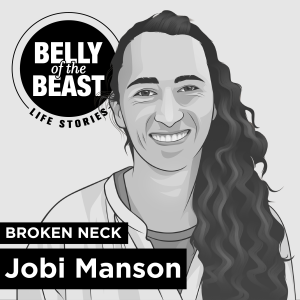
Monday Feb 03, 2020
Monday Feb 03, 2020
At the age of 24, Jobi Manson made a decision that would forever change the course of her life. An experienced surfer, she misjudged the location of a sandbar when she dove headfirst into the ocean, breaking her neck and spending the next moments facedown in the ocean, paralyzed.
Like a scene out of a movie, Jobi survived the accident and learned a valuable lesson that she had to break her neck to reconnect with herself. This discovery led her to start a coaching practice that takes place in the healing and centering powers of the ocean.
EPISODE SUMMARY
- At 24, Jobi Manson was living and working in Venice Beach, CA
- On a hot day in early July, a friend challenged Jobi to get in the ocean - You Only Live Once (‘YOLO’)
- That moment she ran and dove in, misjudging the location of a sandbar
- Jobi crushed a vertebrae in her neck and nearly died face down and paralyzed in the water but was able to will herself to move
- Though she could move, severity of the injury wasn’t clear until the doctor told her she may be paralyzed for the rest of her life
- The surgery was successful and Jobi was sent home a few days later
- Family was around but it was primarily a traumatic experience that Jobi faced alone
- She felt a deep shame for the accident - there’s no record of it ever happening
- Several years after the accident, Jobi would finally heal the persistent pain in her neck with help from a dolphin whisperer and a dolphin that sent an energy wave through her body
- Looking back, Jobi sees the accident as being anything but that -- it was a homecoming and a chance to live a different life
QUOTABLES
“And I'll never forget this: I turned to one of my coworkers and I was like I'm just gonna sit this one out and she looks at me and she was like, Jobi 'You Only Live Once.' And as she said that, I ran and I dove headfirst into the ocean and nothing, I blacked out. My arms went above my head and I smashed into a sandbar. And I don't know how long I was blacked out, but I came to and I realized I couldn't feel anything beneath my neck. I was completely paralyzed and immobilized. And I was face down in the ocean."
“And so as I lay there motionless in the ocean, my body was moving, but because of water, not from my own will. And I told myself that I had to get up. And I told myself that over and over and over again until about probably I imagined five, six, seven minutes later I was able to stand and I couldn't hold my head up. I've always been a bit physically reckless. But this was by far a threshold I had yet to breach.”
“And I was mortified. I was so embarrassed because everything that led up to that moment was me trying to prove myself.”
“You have seven vertebrae in your neck and you crushed number five. And you may, in fact, be paralyzed, even though you can move now.”
“And there's an overwhelming sense of: I am right here, right now. And it was such a humbling catapult into my body in a way that I think I had spent the first 24 years of my life running away from.”
“I thank, you know, the powers that be that it happened in this country. There have been many times in my life where I've been on beaches that are very remote. And I was extremely lucky to have that kind of accident happen when I was so close to the best possible medical care there could be. I used to feel very invincible. I don't anymore at all. And there was something very special that happened that day. It was probably the most important moment in my life.”
“The paralyzing fear of what life could look like without movement was and is not acceptable to me that I couldn't live that way. I'm sure I could. I wouldn't want to.”
“I love life. I love being out in the world with the elements, with nature, with people. To be, to have that taken away from me would be worse than death.”
“The ocean is my home. It's my family. It's where I go to be myself. It's where I have the best time being myself. It's...
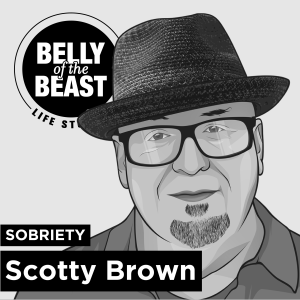
Monday Jan 27, 2020
Monday Jan 27, 2020
Scotty Brown's Belly story centers around his rough and tumble days in Chicago. At a very young age Scotty was a drug kingpin by day and a rock n roll partier by night. This lifestyle caught up with him and getting out wasn't as easy as it might seem. Several decades later, and sober for that same amount of time, Scotty's story, and ongoing work in addiction and recovery, has touched thousands of lives.
EPISODE SUMMARY
- Our story begins decades ago when Scotty Brown woke up in a mental institution - and we return to this moment later in the story as the moment of surrender
- At an early age, Scotty Brown was involved with selling drugs, making a lot of money, and spending that money on toys like a condo in Chicago and a Mercedes in San Francisco
- His condo in Chicago earned him the nickname ‘Downtown’ Scotty Brown because it was downtown
- In his early 20s, the lifestyle started to catch up with him -- ultimately he moved from Chicago to San Francisco to live a ‘healthier’ life because the bars weren’t open all night and health food joints were everywhere.
- He grew up with some well-known mafia families and told us that he was mobbed up.
- Scotty was selling 50-pound bales of marijuana at a time.
- He was selling and using and overdoing it - the lifestyle was catching up
- Scotty was paranoid and not sleeping and had a psychotic break which led him to the mental institution
- Over time, Scotty realized that he had no control over people, places and things and all he could do was take care of himself which eventually led him to ask to be moved up to the drug rehab department
-He wanted serenity and luckily he was rocketed into the ‘Fourth Dimension’ -- he was given a whole new lease on life
- Recovery is a daily lifetime practice -- the wily Scotty Brown still wants to come out
- 10 years ago Scotty battled cancer and many of the people he has helped through addiction and recovery told him how special he was to them - that he had saved their life - a spiritually fulfilling feeling
- Scotty was a catalyst for the SOBA Recovery Center in Malibu, CA
QUOTABLES
“I'm here to save you because at this moment in time in my life, I thought I was the savior of the world, the second coming. And that's never a good thing. That's a lot of stress, you know, trying to save the world. LOL. ”
“A couple of them [in the mafia] were pretty successful in the business like myself. I was a good salesman. So, yeah, I worked with them and, you know, I guess you could say we were all mobbed up. You know. You just fall into it by doing that enterprise. You know, criminal.”
“I always knew I drank and and used a lot, so I tried not to do it. What I thought was fun and games, you know, became a career. So that was a lot of fun... Until it wasn't. It all catches up to you. And asking... I'd be so high, God, help me, please bring me down, I'll never do it again. I know I said that last week. And like the third time, I'm like, man, I'm powerless over this.”
“I guess I'm part of the mob. You know, we're a group of guys that get together. Doesn't matter what nationality you are or anything like that. We're in a criminal enterprise and we don't want anyone to know and we're the mob.”
“You know, I wanted to change, that's where I pretty much bottomed out when I realized where ever I went, there I was, I couldn't escape myself.”
“But my life was unmanageable, I didn’t want to accept it, and it just clicked. You know, like a light bulb went off man, and I told myself that's what I'm doing!! I'm running around trying to save the world and not taking a look at myself. All I do is take, take, take, I'm powerless over people, places and things. I was focusing on the outside world but then I realized, all I can do is take care of myself . I went right up to the nurse and said, I'm a drug addict and an alcoholic, put me on the drug and alcohol ward,and they did. It was like the biggest weight lifted...
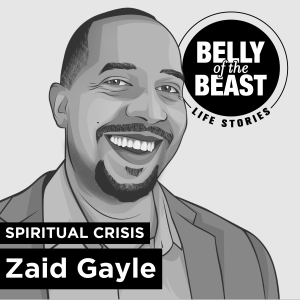
Monday Jan 20, 2020
Monday Jan 20, 2020
Zaid Gayle was raised in a deeply religious family that was influential in the Black Panther Party. This Belly story illustrates how Zaid came to terms with spirituality through his own lived experience.
Zaid is the co-founder and executive director of Peace4Kids, a nonprofit that provides a safe space for youth in foster care to build meaningful relationships with each other and adults.
EPISODE SUMMARY
- Zaid is an L.A. native with a deep spiritual grounding
- At the age of 27, Zaid’s relationship with his wife and his non-profit take a nose dive
- A fertility doctor told Zaid it was his ‘fault’ they couldn’t have a baby
- A vegan, Zaid didn’t want to take fertility drugs which have proved to cause multiple pregnancies, etc.
- In this spiritual crisis, a member of Zaid’s board of directors invites him to take ‘earth medicines’ in Joshua Tree
- The experience/trip opens new understandings about both his relationships and the future of his non-profit
- Zaid pivots to the new relationship and she gets pregnant quickly
- Through these difficult times, Zaid realizes the beauty in the fragility of life and shifts his life to focus less on control and more being present
QUOTABLES
“And I woke up one day and she told me she was no longer interested in us being married. And it was hard for me to understand that from the perspective of what I've been taught in my spiritual training and my spiritual life.
“You grow up in this spiritual world and my interpretation of that was you suppressed all those emotional energies that don't represent joy and happiness and prosperity and abundance and all those things that we think we want to have an experience of in our life. We don't talk a lot about the shadow side and the depths and the darkness.
“The things that I've been taught to use weren't working and I didn't know how to ask for help. And so that spiral just got deeper and deeper and deeper. And I went in to this this solid well of depression where I was literally crying every day in and and unable to sleep.
“But in this situation, my son was like, that's the mother. If you want to bring me onto the planet, you need to connect with her.
“I say, look, I know it's going to sound crazy, but you're supposed to be the mother of my child. And she said, no, no, I'm down. And a month later, she was pregnant.
“When we think about what was happening to Peace4Kids at that time -- I had to walk into a board meeting and tell them that I had failed. And I was used to always winning and figuring it out on my own.
“And so, you know, in my life, I have all this this sadness and I'm failing in every aspect of who I believe I am as a human being. Right. This community leader who's leading an organization that serves youth in foster care. These people who are my staff were depending on me to do my job well so that they could feed their families. And I'm telling them all that I failed and feeling highly responsible because I've had to tell the same thing to my wife that I failed and I'm unable to create the family that we were committed to having.
“And this idea of me standing as this big figure, this looming figure in all of these areas of my life, and then looking at myself in the mirror and saying, you suck. None of these things that you think you are is who you are. And part of it for me was then to reflect like, how did I get to this identity of self? And that question became something that was really present for me. And that was the question that broke me down, you know? That was the question that made me have so many sleepless nights because I felt like I'd been lying to myself my whole life.
“And now I started a whole new chapter with someone else before the divorce papers are even signed.
“There's a lot of aspects to who we are and that your darkness, these places that we're afraid to go to can have a lot of light and have a lot of energy and...
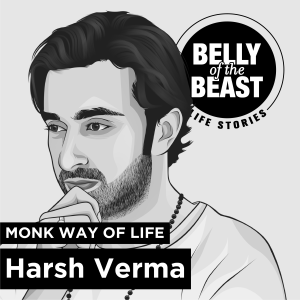
Monday Jan 13, 2020
Monday Jan 13, 2020
After a botched knee surgery, Harsh Verma went to the Shaolin Temple in China and became the first non-Chinese national warrior monk. Kung Fu originates from Shaolin.
EPISODE SUMMARY
- Harsh was an elite athlete and at an early age played pro soccer
- Too much calcium led to a need for what should have been a rather typical knee surgery
- During surgery, doctors discovered a large tumor that had to be removed
- Harsh’s recovery post-surgery wasn’t working
- A good friend pointed him in the direction of martial arts
- Harsh landed on the world famous Shaolin Temple in China, known as both the founding place for Zen Buddhism and Kung Fu
- Shaolin Temple is also an alternative medicine facility and Harsh decided it could help with his recovery
- Shaolin’s roots point back to Bodhidarma, a famous Indian Eminent Monk and the 28th Patriarch of Buddha
- Harsh had to use translation apps to figure out how to communicate in the beginning
- At nine months, Harsh was fluent in Chinese
Harsh spent a total of four years in Shaolin Temple
- After feeling fully recovered in month 7, Harsh never considered going back to soccer or to make films in Bollywood
- At 1.5 years, Harsh told the Temple that he had to leave because he couldn’t afford to stay; the abbot and others ultimately extended an opportunity to Harsh to stay and become a Warrior Monk - the first non-Chinese to be offered such an opportunity
- Harsh discusses why he left the temple -- to spread the message and may ultimately take the monastery up on its offer to open an Indian branch of the Shaolin Temple
QUOTABLES
“And if I don't sweat, I don't feel good.”
“If you want to do something really different. If you want to be out there and make a change for your own self. You need to take that big risk.”
“ So Shaolin Temple is based on the three basic principles as called in Chinese we say, Chan, Wu and Yi. Chan is like Buddhism, the Zen part, the Zen Buddhism part. Wu is wushu. That's martial arts. And Yi is Yio, the medicine part.”
“ So when you start picturing yourself wanting to be somewhere, you're doing it already. That's the first step of getting there. That's the first thing I learned at Shaolin Temple. And the second thing I learned was listening.”
“ Basically, if there's no passion in what you're doing - doesn't make sense doing it.”
“ Nobody in this world has ever got this opportunity. I mean, after Bodhidharma, there has never been an Indian who was adopted by the temple to become a warrior monk.”
“I look back at it and I think about it as if that wouldn't have happened to me. I wouldn't be in the place that I am right now.”
TRANSCRIPT AVAILABLE
https://inourbelly.com/season-1/episode-8-harsh-verma
Learn more about Harsh Verma
https://vimeo.com/284802786 (Indian in the Temple), a short documentary about Harsh Verma
Harsh has started https://warriormonkacademy.com/ (Warrior Monk Academy) in India
https://www.instagram.com/shaolinwarrior_verma/ (@shaolinwarrior_verma) on Instagram
http://www.shaolin.org.cn/en/ (Shaolin Temple)
ENABLE OUR MISSION
Your podcast is a sacred space and judgment free zone. It's free of advertising and outside influence -- 100% listener supported.
A podcast where you can feel safe to listen and know that you're not alone. Transformation is scary, but not a single butterfly has ever attempted to climb back into the cocoon.
To keep us advertising free and support our mission to heal, inspire and shape lives with extraordinary personal life stories, chip-in $5 a month at https://www.bellystory.com/support/ (BellyStory.com/support).
Thank you for listening.
Warmly,
David All
Creator, Storyteller, Producer
CO-CREATE OUR PODCAST
To submit your story, sign-up for new episode emails, contact us or support our mission with a donation, visit:
https://www.bellystory.com/ (BellyStory.com)
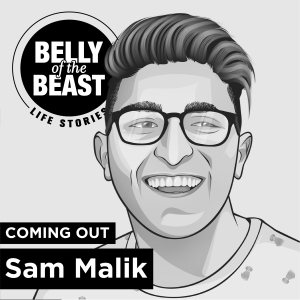
Monday Jan 06, 2020
Monday Jan 06, 2020
Sam Malik shares his inspiring story of coming out .
EPISODE SUMMARY
- 21-year-old Sam Malik opens up about a childhood overcoming the challenges of being in a straight man’s world
- Being an ‘over achiever’ was a mask to hide his sexuality
- Difficulty of growing up in a family with cultural differences
- Homophobia wasn’t always blatant, but was always present
- Inferiority and feeling less than
- Butting heads with family and parents ultimately led to Sam coming out to them first
- Coming out proved to be even more a challenge - now to live your truth - what the is that!
- A series of events led to Sam coming out publicly
- He had organized several laptops, all social media, emails, and text messages to post the announcement at once
- And then he took a three hour ride on his bike and not looking at his devices
- When he opened them up, he read things he had needed to see his whole life - that it was okay, that his best friends were with him no matter what, that he wasn’t alone
- Sam makes recommendations to those still not out or thinking about coming out
QUOTABLES
“Because at the time that that meant to me that I was less than, and when you grow up hearing the things that I heard and being told in the church that being is less than, inferiority is the biggest fear. It's the worst kind of scary monster you can imagine.”
“That was the culmination of me growing up in survival mode, walking on eggshells, wondering if I was gonna get bullied or policed for every little behavior and if I was gonna be less than.”
“When I came out I had been spending so much-- I put so much energy into hiding and masking who I was and doing that with achievements and with grades and leadership and a business that people say when you come out it's this huge weight off your shoulders. You start to be who you are and live your authentic truth, right? Like that's what they say. But the reality for me was, all of these walls had suddenly broken down and I was left sitting in the middle of it, feeling totally exposed, wondering who the am I?”
“And at that point I wasn't even emotionally confused anymore. I wasn't sad. I was fed theup. I needed to stop living this lie.”
“And I had to go through and just flag apologies and get them out over and over again. And I had to remove every ounce of apologetic tone from this thing. And that took a lot of work. And I literally had an operation for this thing because I knew like this was the moment that I needed for myself and I was ready to own. And I was I was so ready for this. I had two laptops, and my phone, and on my phone I had an Instagram post loaded, that was the same thing as the Facebook post that was on my one laptop, and then my other laptop then had an email with two Gmail inboxes drafted to my grandparents because I wanted to tell them before them hearing from the general public. And then a couple text messages drafted to my best friends. And like within a matter of 30 seconds it was boom, boom, boom, boom, boom, boom. Send. Slammed those laptops closed. Put airplane mode on my phone. It's not going to be reversed. And maybe, just maybe, if there is hate, somebody who really needed to hear this is gonna get to hear it. And to me, that makes the whole thing worth it.”
“I'm proud of the person I am. I'm proud of the person I'm becoming. And I'm proud to be ."
“I felt safe when I was alone. I felt safe when I was alone and like listening to music and and I felt safe when I was talking to like the less than a handful of either friends or a few more than a handful of like really amazing, incredible, supportive friends who truly thought no differently at me.”
Learn more about Sam Malik
Sam's company, Malik Media
Read Sam’s https://www.instagram.com/p/BUpcEwpDI3t/ (coming out post) on Instagram
Influencer Troye Sivan's https://www.youtube.com/watch?v=JoL-MnXvK80 (coming out story
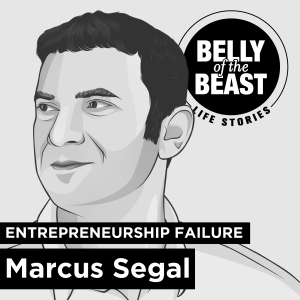
Monday Dec 30, 2019
Monday Dec 30, 2019
Failure is a part of the entrepreneurship journey. The "dot com" bubble was a period of time when the Internet was booming and companies offering everything from pet supplies to streaming music went down the drain almost overnight.
Marcus Segal's story is one of becoming aware of the inner critic in our life that blames us for failing and limits our beliefs in what's possible in ourselves.
Failure is a speed bump, not a stop sign. Marcus is successful -- now the CEO of ForeVR Games and the former chief operating officer for Zynga, helping take the gaming company from dozens of employees to thousands.
EPISODE SUMMARY
- Marcus Segal had a successful career as a producer for TV shows on the History Channel and A&E when his estranged father’s death made him change gears
- In 1998, Marcus was lured to Silicon Valley during the first ‘dot com bubble’
- He found a job and ultimately a path to career growth at eMusic.com which was the first legal streaming music platform
- The company went public and when the VP of Human Resources left, Marcus was tapped; he had made it
- Napster, the pioneering peer-to-peer file sharing website that focused on music downloads, emerged and eroded eMusic.com’s value and relevance
- Shares dropped to $0.99 but Marcus was promoted to Chief Operating Officer
- Two acquisitions left the company on life support and Marcus was literally the last employee out of more than 400 and had to beg to be fired so he could move on
- Finally the road ended and Marcus’ inner critic took over the wheel
- Marcus had to get out of town to change his mindset and went to the Sahara Desert
- A calm night after a sandstorm with a nomadic family triggered gratitude and purpose
- Marcus returned to San Francisco with a renewed perspective, started a new startup, and began giving back to startups as a mentor
QUOTABLES
“At the time this is 1998 and the dot com boom Web 1.0 was really kicking off. You were reading about Internet millionaires and these, you know, women and men changing the world. And I decided that I wanted to be a part of what was next, that I didn't want to continue to spend my life telling the stories of what other courageous people had done in the past in these documentaries that I wanted to be a part of what was next.”
“The company (eMusic.com) went public. A V.P. of human resources left and I was tapped to take on that role. So now, boom, I'm a tech executive, which is really incredible because I majored in English literature in college. I had never written a line of code and I was just hungry and I just worked all the time and I was just thrilled.”
“So at that moment, eMusic was selling lemonade and Napster was giving away beer.”
“My great job of being the COO of this tech company became a job of rearranging the deck chairs on the Titanic.”
“I had something to prove. I needed adoration and love and respect. And the way that you got something like that in my family. My family is just loaded with overachievers is to achieve.”
“The idea of work life balance work was my life, and in work I found my balance.”
“C.O.O. of a fifty thousand square foot empty building.”
“But the stink of dot.com failure was on me and the whole of the Internet all of the tech companies were starting to hit the wall.”
“It felt like my inner critic and karma got together and just decided towith me.”
“Then the story I had told myself: Once you have the money, you'll figure it out. Then I had the money but I had no idea how to figure it out.”
“I felt like a failure. A clown. Aup.”
“Something clicked and I realized that this whole thing, this whole being alive thing is so special and miraculous. That I could have just as easily been born to this family. It's you know, we're just energy. I realized that I had an attitude problem. That I need to climb out of this. I realize that happiness is a choice. I realized that I needed to choose happiness, that I needed to change my...
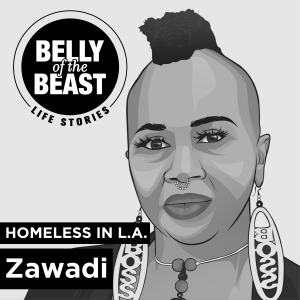
Monday Dec 16, 2019
Monday Dec 16, 2019
Zawadi's Belly story illustrates the transformative journey caused by unintended homelessness due to the loss of her 14 year life partner. Zawadi found her voice and helps others see the light.
EPISODE SUMMARY
- In 2013, Zawadi’s life partner of 14 years died from cancer
- With no place to turn, Zawadi found refuge with a narcissistic abuser
- Zawadi finally escaped but with nowhere to go, ended up homeless
- She lived for six months in a homeless shelter that felt more like a jail
- At her lowest point and contemplating suicide, Zawadi found her voice and purpose
- Skid Row in Los Angeles was the ‘first level of ’
- An old friend helped Zawadi learn about finances and more
- Stigma of homelessness and media portrays wrong -- every time Zawadi goes to speak at corporate events someone tells her they are living in their car
- Zawadi is grateful and living a meaningful, purpose-filled life
QUOTABLES
“But from there I was looking for refuge and I ended up in the arms of a narcissist abuser. I was in such a dark place, but there was still a little bit of light, you know. And that journey let me into the belly. And so that's where purpose began in the belly.”
“Actually I've only been housed two years. And even that homeless journey was a nightmare. But here, through that whole process, the trauma that I went through. I lost my voice. I couldn't speak. Because of the trauma was so dark.”
“It was a homeless shelter, but it felt like we were in jail.”
“But what he didn't know that I was about to commit suicide. And because I'm a woman of my word and my integrity is very important to me. I went ahead and went to that writing class and that was the day that my life changed. Eyvette (Jones-Johnson) was up, she's the founder of Urban Possibilities. And she began to speak, and for the first time, it was like she was chipping at the reservoir. Was chipping at my heart. And that was the first time that I was able to let a little tears come out. I remember how the tears were burning my face. And that was the first light that I saw while in that belly.”
“Those three years of being homeless was very humbling. And it stripped every ounce of pride that I've ever had.”
“But part of me living in that shelter, I had to get up. I had to get up. I had to have purpose every day to get up. Because if not, I would still be there. You have to get up every day when you're in that situation. You have to have purpose. If you don't have a purpose you're not going to make it out. I was in survival mode. And I know what it feels like to be hungry. I know what it feels like to have to look on the ground for pennies to try to scrape up a dollar. And I know what it feels like to be judged. I had a lot of shame. A lot of shame. I will be on Facebook watching everybody else's lives. You know, this person is in Hawaii, this person's in London, Paris. And I'm in an abandoned building. Hungry. And no money. But I knew there was a purpose behind it. Skid Row is the first level of .”
“It was just a very humbling time, but it was just stripping me. I had to go through this transformation.”
“My transformation began when (my partner) died. My transformation began when I had to escape for my life. My transformation began when I was homeless. My transformation is.. I'm still transforming.”
“And now I'm light. I know I'm light. I'm light in dark places.”
“I'm on this quest of just being open and you know, just being available and surrendering. I'm in a place that's surrendering to the process. I just surrender.”
“But when we go out to speak in in corporate America, I'm always approached by someone that's working in corporate America that lives in their car.”
“But the beauty about it is that I got. And the beauty about it is that I wake up every morning kissing the sun. I wake up every morning knowing that I have purpose and I am destined for destiny.”
Learn more about Zawadi
Zawadi's...
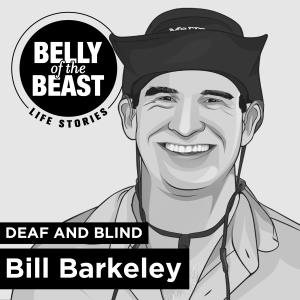
Monday Dec 09, 2019
Monday Dec 09, 2019
Bill Barkeley is both deaf and blind, but that hasn't slowed him down. In fact, you could say that Bill lives an adventurous lifestyle. He has summited Mount Kilimanjaro, finished the Boston Marathon two times and hiked the 500-mile Camino de Santiago... just to name a few.
Bill has a rare disease called Usher Syndrome.
As a deaf-blind adventurer, he lives a full life and helps others overcome their obstacles in life. He is the co-founder of https://nobarriersusa.org/ (No Barriers), which embraces an ethos of finding purpose to get around obstacles in life, especially oneself.
EPISODE SUMMARY
- Bill was profoundly deaf from the age of 5.
- At the age of 28, Bill was married, working at Fortune 500 company, and had just had his first baby and living in San Francisco.
- Several car accidents made Bill go to the eye doctor - thinking he needed glasses.
- Eventually a specialist diagnosed him with a rare disease called Usher Syndrome - type II - the leading cause of deaf-blindness.
- You can imagine this felt ‘like a death sentence’ to hear that you were going blind.
- Bill surrendered on his first adventure - climbing Mount Kilimanjaro in Africa - he let go and found himself - letting go of what he thought the world was expecting of him.
- Bill’s adventures have deep meaning and purpose - but also fun and difficult.
- Bill talks about his wife and the role of the spouse and caregiver.
- Coping skills - accept yourself and surround yourself with the ‘rope team.’
- No Barriers USA - Bill’s non-profit helps folks get over the largest obstacle, 90 percent of the time it’s them.
QUOTABLES
- “It just felt like a death sentence, even though I wasn't dying. It was really about the realization that life was not going to be necessarily on my terms.”
- “If you go out to life it's great, but life isn't going to come to you.”
- “So the minute I let go of what I thought the world was expecting me to do that climb. Is the time, I said, you know, I'm going to do this. I can do it. I made it this far. And it's not about them. It's about me and about finding a new direction and new focus on my life.”
- “Kilimanjaro... One of the insights that we've been talking about is finding yourself. But it's also about that time when you make the decision to live, you know that life is worth having and that you really can't imagine it not being there. “
- “You can call me a lot of things: A father, a son, a husband, a community member, a board member, you can call me some not so nice names. You can call me some good names. You can call me deaf. You can call me blind. They're just ways people describe me. But it doesn't have to define me. I define myself every day by what I do or where I go.”
- “Impact is powerful. We get great gifts by taking on challenges and adversity and mountains in our lives. We get the reward of knowing that we can make ourselves and other people on the human journey better, more satisfied, happier and fulfilled. So that's why I do adventures.”
- “You know, it's important to just realize life doesn't come to you. We are tasked with the purpose of making the life.”
- “So the coping piece of it is really comes around a number of different things. One is accepting yourself, realizing that you have your constraints and challenges. That's one piece. Another piece is surrounding yourself with what I call the rope team. I mean, people that really care about you. People that will listen to you. People that want to help in some way or capacity... have an emotional connection to you. And that you matter to them or you matter to life or things around you. That really means getting over yourself and saying, you know, I need help.”
- “To me, coping is realizing that it isn't going to come from just inside you. It's going to come from the world around you. And it's how you use the tools and resources and other people in the world around you that is going to define your ability to cope.”...
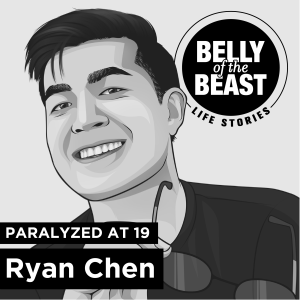
Monday Dec 02, 2019
Monday Dec 02, 2019
At the age of 19, Ryan Chen was in a serious snowboarding accident that would ultimately paralyze him from the waist down. Ryan was forced to open his eyes to this new reality, learn to not blame himself and become comfortable with the uncomfortable. He learned to adapt, rekindle his love for athletics and ultimately build a successful business.
Ryan is a successful entrepreneur. The company he co-founded, https://getneuro.com/ (Neuro), was featured on the Shark Tank TV show (they didn't take the deal!) and he was named Forbes https://www.forbes.com/pictures/5be1a75da7ea43705916322a/ryan-chen-29/ (30 under 30).
EPISODE SUMMARY
- Describing that snowboarding accident and the complete shock he felt in the ambulance - feeling pain but fueled by adrenaline and a racing mind.
- At the hospital, Ryan didn’t want anyone to know about the accident - didn’t want folks to worry.
- Imagine the doctor telling you that you will never walk again. Ryan didn’t believe it.
- Ironically, pain returning was a welcome sign but reality was setting in.
- The very long and dark process included 2-3 years of opioid pain pills which Ryan gave up cold turkey but also a climb out by rekindling his love for athletics and racing in the LA Marathon.
- Ryan would go on to race in seven marathons and met with the US Paralympic team; ultimately deciding he wanted to pursue other passions, like entrepreneurship.
- Ryan co-founded Neuro with his longtime friend, Kent Yoshimura.
- He was named to the Forbes 30 Under 30 list as a top entrepreneur. (Kent was 30 already so received an honorable mention.)
QUOTABLES
- “It is a rollercoaster. I mean, you're still trying to figure yourself out and then you throw this in and it feels like your whole world stops. And for me, I think it took me two years of like really trying to figure out, well, not only like who I was, what I wanted to do, but like what was my purpose of living? Why did I survive this?”
- “I never told anybody. I told friends not to tell anybody.“
- “Life is constantly changing, it's about adapting to that change.“
- “I think it's about being comfortable with being uncomfortable as kind of like something I always think about. There's always situations where you're like, you know, you're doing something for the first time, It's uncomfortable. And then you do it again and it feels a little bit more familiar. And then by the third time, you're like, I'm pretty comfortable with this.”
- “You know, you're doing the best you can and be patient with yourself, because then you're going to come out on the other side and realize that that's part of your story. And that's that's going to shape who you are.“
Learn more about Ryan Chen
Support Ryan’s company, https://getneuro.com/ (Neuro)
https://www.instagram.com/ryan.ryc/ (@ryan.ryc) on Instagram
ENABLE OUR MISSION
Your podcast is a sacred space and judgment free zone. It's free of advertising and outside influence -- 100% listener supported.
A podcast where you can feel safe to listen and know that you're not alone. Transformation is scary, but not a single butterfly has ever attempted to climb back into the cocoon.
To keep us advertising free and support our mission to heal, inspire and shape lives with extraordinary personal life stories, chip-in $5 a month at https://www.bellystory.com/support/ (BellyStory.com/support).
Thank you for listening.
Warmly,
David All
Creator, Storyteller, Producer
CO-CREATE OUR PODCAST
To submit your story, sign-up for new episode emails, contact us or support our mission with a donation, visit:
https://www.bellystory.com/ (BellyStory.com)
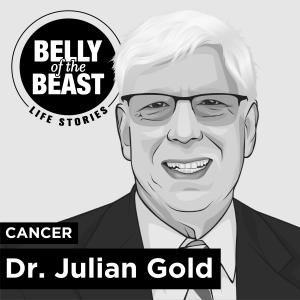
Monday Nov 25, 2019
Monday Nov 25, 2019
In this Belly story, 30-year physician and two-time mayor of Beverly Hills, Dr. Julian Gold, reveals purpose for community service through his trial with cancer.
Dr. Gold was 56-years-old when he was diagnosed with a deadly form of cancer, Acute Myeloid Leukemia. Then a 30-year physician, Dr. Gold was a member of the board of directors for Cedars-Sinai Hospital and one of the most respected medical professionals in Los Angeles.
He had to learn to ‘behave like a patient, not a doctor’ and focus on getting well. Dr. Gold established rules of recovery to stay positive, a playbook worth noting if you're facing similar path. A stem cell transplant procedure helped him survive -- but as you’ll learn being a ‘survivor’ is a tricky word when so many others don’t make it.
EPISODE SUMMARY
- Diagnosis of Acute Myeloid Leukemia
- Don't search for answers on the internet!
- Chemotherapy treatment, staying in hospital, good days and bad days
- Stem Cell Transplant - urges everyone to get swabbed via ‘Be the Match’ program
- Talks about important role of caregiver, family and community
- Daily Rules of Recovery to stay positive and focused on getting well
- Life after treatment - recovering to return to normalcy, enjoying 'sweating the small stuff' instead of the 'big stuff'
- Survivor is a ‘loaded word’
QUOTABLES
- “Avoid the internet”
- “I had to behave like a patient, not a doctor.”
- “This was like getting struck by lightning, I was fine one day and sick the next.”
- “You have to take care of the caregiver.”
- “Don’t sweat the small stuff unless it’s an indication of normalcy.”
- “Recovery is not a straight line, expect good and bad days.”
- “I got stronger for it.” Changed perspective on the world, greater appreciation for family and community, and greater sense of gratitude.
Learn more about Dr. Gold
Dr. Julian Gold on https://www.instagram.com/goldjmd/ (Instagram)
"https://bethematch.org/ (Be the Match)" stem cell donor program
https://www.cityofhope.org/ (City of Hope) Cancer Treatment and Research
ENABLE OUR MISSION
Your podcast is a sacred space and judgment free zone. It's free of advertising and outside influence -- 100% listener supported.
A podcast where you can feel safe to listen and know that you're not alone. Transformation is scary, but not a single butterfly has ever attempted to climb back into the cocoon.
To keep us advertising free and support our mission to heal, inspire and shape lives with extraordinary personal life stories, chip-in $5 a month at https://www.bellystory.com/support/ (BellyStory.com/support).
Thank you for listening.
Warmly,
David All
Creator, Storyteller, Producer
CO-CREATE OUR PODCAST
To submit your story, sign-up for new episode emails, contact us or support our mission with a donation, visit:
https://www.bellystory.com/ (BellyStory.com)

Your Title
This is the description area. You can write an introduction or add anything you want to tell your audience. This can help potential listeners better understand and become interested in your podcast. Think about what will motivate them to hit the play button. What is your podcast about? What makes it unique? This is your chance to introduce your podcast and grab their attention.